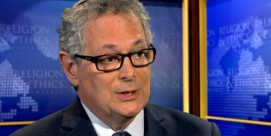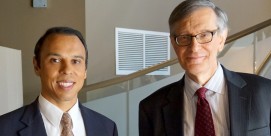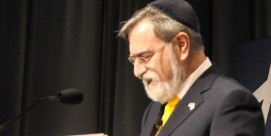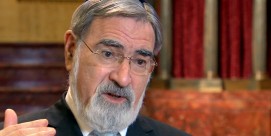Leo Ribuffo: God and the Presidency from Jack to Mitt
In 1960 John F. Kennedy gave two major speeches on what he described as the “so-called religious issue” in the presidential campaign. The second, presented to the greater Houston Baptist Ministerial Association in September, after he received the Democratic nomination, has passed into political folklore. It has been cited incessantly in this week’s run up to Governor Mitt Romney’s address today. The first, given to the American Society of Newspaper Editors in April 1960, when Kennedy’s nomination remained very much in doubt, lingers in obscurity. Both speeches were impressive political performances, filled with signature JFK themes like his wartime record and the imminent threat of international Communism. Both stressed the central point that, as Kennedy told the Baptists, a president’s “views on religion are his own private affair.” But his more candid and annoyed address to the editors went further. “The President is not elected to be protector of the faith — or guardian of the public morals. His attendance at church on Sunday should be his business alone, not a showcase for the nation.”
From the perspective of 2007 — indeed, from the perspective of presidential politics since 1976 — such views sound almost as archaic as Thomas Jefferson’s declaration that he cared not whether his neighbor believed in no god or twenty gods. This change in the political zeitgeist does not simply reflect growing religiosity in the electorate. On the contrary, depending on where and how we look, Americans in the aggregate are less religious now than in 1960. Rather, starting with the polarized high “sixties” that began a half decade later, social and cultural issues related to religion have become a larger part of the nation’s political divisions. As religion-related issues multiplied, so did rival groups dedicated to mobilizing the devout, the secular, and those in between. In 1960, despite rising Catholic and Protestant tensions during the previous decade, Kennedy could affirm the “absolute” separation of church and state, reject diplomatic relations with the Vatican, call federal aid to parochial schools unconstitutional, and be done with it. The chances of Congress passing a foreign aid bill funding birth control seemed “very remote,” he said. And of course Kennedy spoke thirteen years before Roe v. Wade legalized almost all abortions.
With varying degrees of piety, sincerity, and success, presidential candidates have adapted to and promoted the proliferation of religion-related issues and a zeitgeist that now seems to impose a de facto religiosity test for the major party nominations.
Jimmy Carter’s courtship of his fellow “born again” Protestants helped him win the 1976 election but many of them defected from his coalition when they discovered on closer inspection that Carter was theologically and politically more liberal than he had sounded. Ronald Reagan, an eclectic Protestant with a Catholic father, toyed with religious beliefs ranging from Baha’i to premillennial prophecies of Jesus’ imminent return. On the thinnest of evidence, he convinced most evangelicals and fundamentalists that he, too, was a born again Christian, and the briefly influential new Christian right accepted a very junior partnership in the Reagan coalition. As president, Reagan’s religious style recalled Eisenhower’s affirmations of religion in general; he began the contemporary practice of ending speeches with “God bless America.” On thinner evidence and with less success, George H. W. Bush claimed that he, too, was sort of born again. Bill Clinton, who combined spiritual searching and womanizing in the fashion of Lyndon Johnson, continued the speech-ending ritual of asking God to bless America. George W. Bush, a moderate evangelical himself, has given a larger governmental role to the Christian right than Reagan did because that interest group is now more firmly established in the Republican Party.
Meanwhile, the specific issues related to religion have waxed and waned. For instance, most Americans stopped noticing that numerous presidential contenders since 1960 have been Catholics. Even among pundits, who knew in 1988 that Alexander Haig’s brother was a Catholic clergyman? Throughout these three decades, however, religious liberals and militant secularists have continued to warn that the “wall of separation” between church and state has been breached and perhaps seems on the verge of collapse.
In short, the period since 1976, characterized by religion-related issues and an open mixture of religion and politics, looks like most eras in American history rather than the atypical “fifties.” Yet even in that stereotyped era, conflict, including substantial religious conflict, could be found just below the enforced consensus.
Viewed in this context, in which conflict relating to religion is viewed as the American historical norm rather than the exception, is there a major “Mormon issue” in contemporary presidential campaign? If so, is it comparable to the “Catholic issue” in 1960?
There is at the moment a Mormon issue in the Republican Party centered on the state of Iowa. Specifically, there is a close race in the upcoming caucuses between former Massachusetts Governor George Romney, a member of the Church of Jesus Christ of Latter-day Saints (LDS), and former Arkansas Governor Mike Huckabee, a Baptist minister and television evangelist before he entered politics. This competition has drawn attention to differences between Mormons on the one hand and evangelical and fundamentalist Protestants on the other.
In theological terms, the differences are substantial. Although the LDS Church developed out of the lively Protestant religious stew of the early nineteenth century, Mormons under the leadership of Joseph Smith and Brigham Young intended to improve upon Christianity, with significant departures even from the increasingly amorphous standards of the day. These included new scriptures, including most famously the Book of Mormon, new core beliefs, such as Jesus’ presence in the western hemisphere after the resurrection, and controversial practices, such as direct revelation and (until 1890 and most notoriously) plural marriage.
Until the early twentieth century, evangelical Protestants often paired popery and the LDS as comparable autocratic and lecherous evils. If anything, the Mormons looked worse. Catholicism could be viewed as a precursor, a legitimate defender of the pure faith until it went astray. The LDS Church claimed to be a successor, holding that all of the proliferating denominations growing out of Reformation Protestantism needed to be replaced. To reformed Protestants this upstart faith looked like an un-Christian cult. Indeed, Joseph Smith had called himself the second Muhammad.
Our lives are often more flexible than our doctrines, and the religious rank-and-file in America have always mixed incongruous beliefs in ways that distressed their clergy. By the 1950s most animosity to Mormonism had dissolved in the solvent of religion in general. By the late 1970s, evangelicals, fundamentalists, and Mormons often united in defense of “traditional” values. Jerry Falwell might have suspected that Mormons were doomed to hell but, in the meantime, they were welcome to join the Moral Majority. During the past quarter century, Mormons have typically placed a stronger emphasis on Jesus Christ as savior and in general sounded more and more like evangelicals.
Yet significant tensions remained. Not only was Mormonism not really Christian in the eyes of many evangelical and fundamentalist leaders, but also these theological conservatives and the LDS competed in the missionary field. Doctrinal differences and lingering suspicions provided an opening for political exploitation — especially in the insular world of Republican caucuses and primaries.
Governor Romney apparently thought he could win the Republican presidential nomination by combining relatively cosmopolitan appeals in places like New Hampshire, where there were few religious conservatives, while fitting into the traditionalist family values niche in places like Iowa, where there were lots of them. Few Republicans in New Hampshire seem to care that Romney is a Mormon. But evangelical and fundamentalist Republicans in Iowa apparently do, as they almost certainly will in states with comparable religious constituencies.
Still, how deeply they care and what this says about religious tolerance in the United States is hard to say. Undoubtedly they would care less about Mormonism if Romney’s chief opponent were Rudolph Giuliani, a thrice married Catholic of sorts. But Governor Huckabee fills the traditionalist family values niche just as well as Romney, and he is, more importantly, an evangelical himself.
An even harder question is to what extent evangelicals in Iowa are supporting Huckabee because he is one of their own, a fact he is strongly advertising, and to what extent he is winning support because his campaign is exploiting anti-Mormon sentiment. According to press reports, Huckabee has declined to say whether or not he considers Mormonism a cult or just a different but legitimate version of Christianity. An American is certainly allowed to believe and declare that “my religion is better than yours,” but at least since the 1930s no serious presidential candidate has said so even in private. Perhaps Huckabee should be the candidate giving a speech on church, state, and religious tolerance.
Romney’s speech on those subjects contained few surprises. Much of it echoed Kennedy in 1960. He was a American running for president who happened to be a Mormon rather than the Mormon presidential candidate. He endorsed the separation of church and state. He would not take orders from LDS leaders. He would rather lose than repudiate his faith.
Most of the civil religion passages could have been lifted from addresses by Eisenhower or FDR. The merit of religion in general was a persistent theme. Liberty was said to be God’s gift. John Adams and Abraham Lincoln were invoked as men of faith, as indeed they were, but Romney did not note that their Christianity was considerably less orthodox than Hillary Rodham Clinton’s Methodist social gospel. Following the now standard ritual, he ended by asking God to bless America. He did not suggest, along with Lincoln, Jimmy Carter, and even Richard Nixon, that God might decide otherwise.
Three points were noteworthy, if far short of extraordinary. First, fighting for the traditionalist family values niche, he promoted religion in general in the public square, including religious symbols in literal public squares, and scorned the “religion of secularism.” Second, perhaps to reassure evangelical and fundamentalist Protestants, he called Jesus the “Son of God and Savior of Mankind.” Third, Romney admitted that religious intolerance is one of our American traditions, and he cited the travails of dissident puritan Anne Hutchinson and LDS leader Brigham Young as cases in point.
Romney’s speech will probably not affect the outcome of the Iowa caucus. It does not rank with either of Kennedy’s 1960 addresses as a political performance or a serious discussion of church and state. Nonetheless, the speech shows that Romney has begun to think about questions that he will face over and over and over again if he wins the Republican nomination.
One thing that has not changed significantly since 1960 is the dismal performance of the news media when covering religion and politics. There are exceptions. This week these included Kenneth Woodward’s New York Times op ed on the differences between the situations faced by JFK and Romney. Reporters now feel obligated to call scholars to explain, for example, the difference between Mormons and evangelicals. But expert advice rarely affects the main narrative line, which still highlights the atypical and the lurid. As Kennedy told the editors in his lesser known 1960 speech, they should stop “magnifying” and “oversimplifying” religious issues.
Leo P. Ribuffo, a professor of history at the George Washington University, specializes in 20th century U.S. history and American intellectual history.







